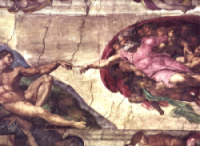The God of monotheism, or the supreme deity in the pantheist, panentheist and henotheistic religions, is not always thought of by believers in the same terms as are deities in many other religions — as a powerful, human-like, supernatural being — but rather, becomes esoteric, the deification of a philosophical category — the Ultimate, the Absolute Infinite, the Transcendent, the One, the All, Existence or Being itself, the ground of being, the monistic substrate, etc.
Theologians and philosophers have studied countless conceptions of God since the dawn of civilization. The question of the existence of God classically falls under the branch of philosophy known as metaphysics, but is also one of the key discussions taking place within the field of the philosophy of religion.
Capitalization
The development of English orthography was dominated by Christian texts. Capitalized "God" was first used to refer to the Judeo-Christian concept, and may now signify any monotheistic conception of God, including the translations of the Arabic Allāh and the African Masai Engai.
- Adonay YHWH as "Lord God"
- YHWH Elohim as "Lord God"
- κυριος ο θεος as "Lord God" (in the New Testament)
More...
includes "El Shaddai" by Amy Grant



No comments:
Post a Comment